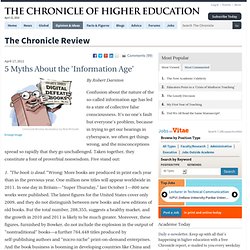

Rising Into the Public Domain: The Copyright Review Management System (CRMS) at the University of Michigan - Fairly Used. Rising Into the Public Domain: The Copyright Review Management System (CRMS) at the University of Michigan Interview with John Wilkin, Associate University Librarian for Library Information Technology and Executive Director, HathiTrust and Principal Investigator for CRMS Mary Minow: Where does CRMS fit into the scheme of other copyright tools, such as the Determinator?

John Wilkin: The Determinator is a good point of comparison for us. It serves as a resource for helping someone make a determination, and what we wanted to do is actually make determinations. The focus is on materials in our Collections, across the HathiTrust partnership. I think we did have, early on, perhaps a naive sense that we might be able to make those determinations without the materials being in front of us, digitally or in print. Minow: When you say digitally in hand, it sounds like researchers are allowed to look at the text, the preface, etc. Wilkin: That’s right. Wilkin: We’re doing the 1923-1963 work. The Filter Bubble. Eetimes. How to Fix (0r Kill) Web Data About You. Marketers, employers, suitors and even thieves and stalkers are piecing together mosaics of who we are.

Even when it is accurate, it may not present a pretty picture. For a glimpse of your mosaic, type your name into Spokeo.com. Prepare to see estimates of your age, home value, marital status, phone number and your home address, even a photo of your front door. Spokeo, one of several services like this online, will encourage you to pay $15 or more, for a full report with details on income, hobbies and online social networks.
Snoops who take the time to troll further online may also find in blog posts or comments evidence of your political views, health challenges, office tribulations and party indiscretions, any of which could hurt your chances of admission to school, getting or keeping a job or landing a date. If you want to try to manage privacy, the obvious first place to start is with the search engines , Bing and , exactly where other people will most likely go to check you out. Book Review - The Information - By James Gleick. Alfred Eisenstaedt/Time & Life Pictures — Getty Images Claude Shannon, the father of information theory.

Gleick makes his case in a sweeping survey that covers the five millenniums of humanity’s engagement with information, from the invention of writing in Sumer to the elevation of information to a first principle in the sciences over the last half-century or so. It’s a grand narrative if ever there was one, but its key moment can be pinpointed to 1948, when Claude Shannon, a young mathematician with a background in cryptography and telephony, published a paper called “A Mathematical Theory of Communication” in a Bell Labs technical journal.
For Shannon, communication was purely a matter of sending a message over a noisy channel so that someone else could recover it. Whether the message was meaningful, he said, was “irrelevant to the engineering problem.” But unlike chaos, information also has a human history. 5 Myths About the 'Information Age' - The Chronicle Review. By Robert Darnton Confusion about the nature of the so-called information age has led to a state of collective false consciousness.

It's no one's fault but everyone's problem, because in trying to get our bearings in cyberspace, we often get things wrong, and the misconceptions spread so rapidly that they go unchallenged. Taken together, they constitute a font of proverbial nonwisdom. Five stand out: 1. 2. 3. 4. 5. I mention these misconceptions because I think they stand in the way of understanding shifts in the information environment. Last year the sale of e-books (digitized texts designed for hand-held readers) doubled, accounting for 10 percent of sales in the trade-book market. Many of us worry about a decline in deep, reflective, cover-to-cover reading. In studies of culture among the common people, Richard Hoggart and Michel de Certeau have emphasized the positive aspect of reading intermittently and in small doses.